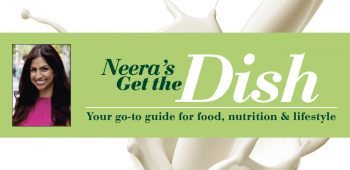
Milking It: Dairy Alternatives
Is good ol’ fashioned milk giving you the gurgles? Wondering if you have lactose intolerance? It might be time to switch out your milk for something different. Here’s the lowdown on some milk alternatives as you venture past dairy for your morning coffee and cereal.
Almond Milk
Almond milk is made from ground almonds. It’s got a nutty flavour but not overwhelmingly so and it works well in everything from coffee to soups. Almond milk is available sweetened or unsweetened with no added sugars. It’s a great milk alternative but not for those with nut allergies.
Nutrition per serving: 40 calories, 0 g saturated fat, 1 g protein, 45 % calcium, 25 % vitamin D
Coconut Milk
Coconut milk is making serious rounds in the milk alternatives world. It is made from the grated meat (fruit flesh) of brown coconuts. If you love the texture and creaminess of whole milk, you’ll love coconut milk as a substitute. The rich texture and flavour of coconut milk is due to the natural high oil content. There are sweetened and unsweetened varieties but even in the unsweetened ones, the coconut flavour delivers a sweetness. Like coconuts, coconut milk is high in saturated fat.
Nutrition per serving: 50 calories, 5 g saturated fat, 1 g protein, 10 % calcium, 30 % vitamin D
Rice Milk
Rice milk is a long-standing milk alternative staple. It is primarily made by pressing brown rice through a mill to strain out the pressed grains. Rice milk is one the sweeter alternatives and is a good choice for those with soy and nut allergies. However, practice caution in selecting a brand as sometimes it is processed with the allergens, so check the label. It lacks the thick texture of the other alternatives, making it too watery for coffee or cereal and it has less protein and more calories than the other options.
Nutrition per serving: 90 calories, 0 g saturated fat, 0 g protein, 30 % calcium, 25 % vitamin D
Soy Milk
Soy milk has been the milk backup for ages. It is a plant-based alternative made by soaking dried soybeans and grinding them in water. It has an excellent texture profile due to its stable emulsion of oil, water and protein. Soy milk is the only non-dairy option that has a high protein content so it’s a great choice for vegetarians and vegans. But given the current studies investigating soy’s potential link to breast cancer and until we know conclusively, ask your doctor if this is a suitable alternative for you in the context of your family history or other potential risk factors.
Nutrition per serving: 80 calories, 1 g saturated fat, 7 g protein, 30 % calcium, 30 % vitamin D
Hemp Milk
Hemp milk is the new kid on the block and it’s quickly becoming a health-food rockstar. It is made by soaking hemp seeds — the edible part of the same plant used to make marijuana — then grounding them in water resulting in a creamy-textured and nutty-flavoured drink. Hemp milk is more creamy and nutty than soy milk and rice milk. It has a high omega-3 fatty acid content, offering heart and skin health benefits. The only downside is that hemp milk is harder to find than other alternatives.
Nutrition per serving: 70 calories, 1 g saturated fat, 2 g protein, 30 % calcium, 25 % vitamin D
BY: NEERA CHAUDHARY
PUBLISHED IN THE HOME & TRAVEL ISSUE, MAY 2015
Neera Chaudhary
Author
Neera Chaudhary is always on the lookout for the veritable wellness ingredients to feed your mind, body and soul because she knows beauty starts from the inside out. Neera helps to make sense of the science behind the plethora of prescriptions out there by sharing the essential elements for a heal...














































































































